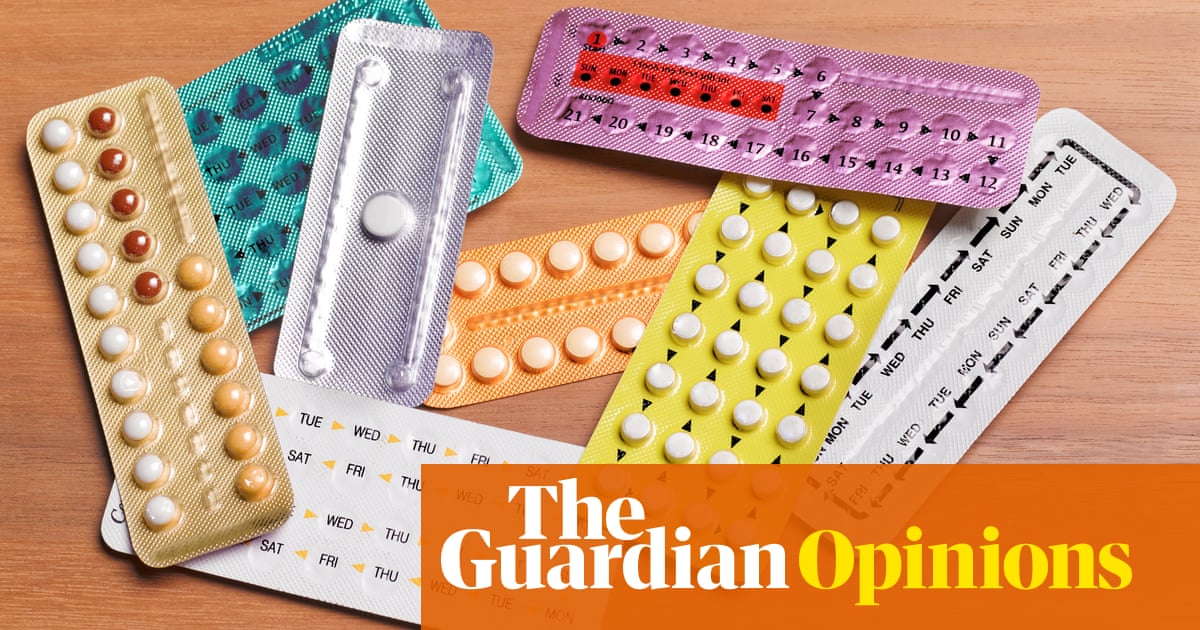
“I feel the same about the pill as I do about the Beatles,” one woman in her 30s told the Times earlier this year. “If I’d been around at the time they first came out, maybe I’d appreciate them more.” This distils so much about the dynamic between doctors, pharma, patients and society in constructing the acceptable trade-offs of contraception: when the pill became available on the NHS in 1961, side-effects simply weren’t relevant. The calamity of unwanted pregnancy, which had beset the species since the dawn of time, had been solved, by raw ingenuity. In terms of the difference it made to the human experience, and this was very much framed as the female experience, the pill was considered one of medicine’s most seismic advances. So what if it gave you mood swings, headaches, acne, or caused you to gain weight? That would be like complaining you were travel sick on the Apollo 13.
Scrolling forward 60 years, the pill is still the most popular form of birth control in the UK (in 2018, 28% of women took it; 27% used a condom) and the progestogen-only pill is now available over the counter. Yet those early assumptions, that no amount of adverse effects couldn’t be weathered, appear to be increasingly rejected by young women. Earlier this year, Davina McCall continued her crusade for more openness around women’s health with a documentary about the pill, in which she surveyed 4,000 women who were on it. An incredible 77% of them had experienced some side-effects, including depression and loss of libido, and one third had stopped taking it as a result. That polling data has not been replicated, and a new mood of distrust towards oral contraception has yet to show up in the data. It reveals itself instead in TikTok content, where women decry the paucity of research into hormonal contraceptives: there were 20 to 25 clinical trials between 2017 and 2020, set against more than 3,000 for cancer drugs in 2019 alone.
Women are no longer prepared to write off the mental and physical effects as private and individual problems. Fundamentally, they are questioning the premise on which all that early stoicism was based, that fertility is a female problem for women to solve. In the 1970s, a male contraceptive, gossypol, was unveiled at a world population conference: its lead researcher, Elsimar Coutinho, later described to this newspaper his astonishment at getting booed by the women in the hall. He’d thought he was equalising a responsibility, but what he had originally considered as the burden of controlling fertility, women experienced as a liberation. It was up to us, and we were handling it. In 2011, a small-scale study asked women whether they trusted men to take a pill every day, and only half of them did. Perhaps this betrayed some impatience with the imputed fecklessness of men, but nevertheless, it also showed a high level of acceptance that the right people had the reins.
The question has gained salience this month, as British men become the first in the world to test a new contraceptive pill. Sixteen volunteers at a clinic in Nottingham will take YCT-529, which works not on a hormonal pathway but by blocking a protein to prevent sperm production. In the end, it took so long not because women booed gossypol all those years before today’s volunteers were born, but because previously mooted male contraceptives relied on blocking testosterone, which was considered too fraught. Trials were also cancelled when side-effects emerged, and amusingly (narrator: it’s not that amusing), these unacceptable side-effects were almost identical to those that have long been considered acceptable for women. It is droll and yet, if you think about it too hard, not droll that the trait associations of testosterone are mainly poetic: vigour, adventure, even aggression has a certain warrior glamour. Traits associated with female hormones, meanwhile – crying a lot and responding irrationally – lean more towards the inconvenient than the epic. It doesn’t surprise me at all that oestrogen was such an easy casualty in the battle against reproduction, while testosterone had to be preserved pending a better, less romantic candidate for intervention.
The male pill lands in a contraceptive debate that’s at a crossroads: unwanted pregnancies in England and Wales are at the highest level they’ve been since the Abortion Act was passed in 1967, with doctors worrying publicly that this is because young women are turning to TikTok rather than their GPs for advice. Social media and femtech combined offer a thriving marketplace of ideas, but unfortunately, it’s perhaps the least well-regulated market in commercial history, and some of the advice is terrible. Period and temperature trackers are no better at preventing unwanted pregnancy than they were 50 or 5,000 years ago. In the US and, astonishingly, the UK, a new authoritarianism around abortion has turned tracking apps into a real source of surveillance anxiety. TikTokers are not necessarily statistically trained, and often focus on the marginally increased breast cancer risk from the combined pill – offset anyway by its protection against ovarian and womb cancer.
So yes, if men could take this responsibility on for a while, that might be more welcome than at any point since 1961. However, even if the side-effects are few to none, the social scrutiny will, I suspect, be deeply unfamiliar: if they have anything like women’s experience as holders of the contraceptive flame, they’ll find their competence at pill-taking constantly in question (by us!) and any negative personal consequence minimised for the greater good.
-
Zoe Williams is a Guardian columnist
"Idea" - Google News
December 27, 2023 at 07:52PM
https://ift.tt/IlQz2ep
In the 1970s, women booed the idea of a male pill. Have we finally changed our minds? - The Guardian
"Idea" - Google News
https://ift.tt/0t3LfQP
https://ift.tt/Q1iLKwM
Bagikan Berita Ini














0 Response to "In the 1970s, women booed the idea of a male pill. Have we finally changed our minds? - The Guardian"
Post a Comment